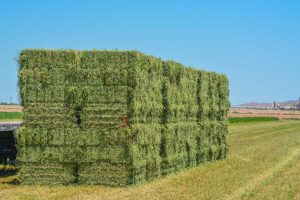
When it comes to feeding livestock, choosing the right type of hay can make a significant difference in their health, productivity, and overall well-being. Alfalfa hay stands out as an excellent choice for both cattle and goats due to its high nutritional value and numerous benefits. In this article, we’ll explore the advantages of incorporating alfalfa hay into the diet of cattle and goats and why it is considered a superior feed option.
Nutritional Benefits of Alfalfa Hay
High Protein Content
Alfalfa hay is renowned for its high protein content, which is essential for the growth and development of livestock. Cattle and goats require adequate protein for muscle development, milk production, and overall health. Alfalfa hay typically contains around 15-20% protein, making it an excellent source of this vital nutrient.
Rich in Vitamins and Minerals
Alfalfa is also rich in essential vitamins and minerals such as calcium, potassium, magnesium, and vitamin A. These nutrients play crucial roles in maintaining strong bones, proper metabolic functions, and overall health in both cattle and goats.
High Fiber Content
The high fiber content in alfalfa hay aids in proper digestion and prevents common digestive issues such as bloating and colic. The fiber also helps maintain a healthy gut flora, which is important for nutrient absorption and overall digestive health.
Benefits for Cattle
Enhanced Milk Production
Dairy cattle, in particular, benefit from the high nutritional value of alfalfa hay. The protein and calcium content in alfalfa hay support higher milk yields and better milk quality. This makes alfalfa hay a preferred choice for dairy farmers looking to optimize milk production.
Improved Weight Gain and Growth
For beef cattle, the protein-rich alfalfa hay promotes better weight gain and muscle development. This leads to healthier and more robust animals, which can positively impact the profitability of beef farming operations.
Better Overall Health
The vitamins and minerals in alfalfa hay contribute to the overall health and well-being of cattle. Stronger immune systems, healthier coats, and better reproductive health are just a few of the benefits that come with feeding cattle alfalfa hay.
Benefits for Goats
Increased Milk Production
Similar to dairy cattle, dairy goats benefit significantly from the high protein and calcium content in alfalfa hay. Goats fed with alfalfa hay tend to produce more milk with higher butterfat content, which is desirable for cheese and other dairy products.
Improved Growth and Muscle Development
Young and growing goats need adequate protein for proper development. Alfalfa hay provides the necessary nutrients to support healthy growth and muscle development, leading to stronger and healthier animals.
Enhanced Reproductive Health
The nutrient-dense nature of alfalfa hay supports better reproductive health in goats. Improved fertility rates and healthier offspring are some of the positive outcomes associated with feeding goats alfalfa hay.
Healthier Coats and Hooves
The vitamins and minerals in alfalfa hay contribute to healthier coats and stronger hooves in goats. This is important for the overall well-being and mobility of the animals.
How to Feed Alfalfa Hay
Proper Storage
To maintain its nutritional value, alfalfa bales should be stored in a dry, well-ventilated area. Avoid exposure to moisture, which can lead to mold and spoilage.
Gradual Introduction
When introducing alfalfa hay to your cattle or goats, do so gradually to allow their digestive systems to adjust. Sudden changes in diet can cause digestive issues.
Balanced Diet
While alfalfa hay is highly nutritious, it should be part of a balanced diet. Supplementing with other types of forage and grains can ensure that your livestock receives a well-rounded diet.
Conclusion
Alfalfa hay is an excellent feed option for both cattle and goats, offering high nutritional value and numerous health benefits. From enhanced milk production to improved growth and overall health, incorporating alfalfa hay into the diet of your livestock can lead to significant positive outcomes. By understanding the benefits and proper feeding practices, farmers can optimize the health and productivity of their cattle and goats with alfalfa hay.